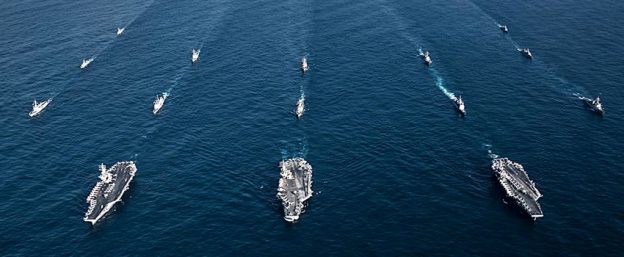What are the realities surrounding North Korea’s announcement of its suspension of its nuclear and ICBM missile testing?
There is little doubt that the unexpected move will be seen as a victory for the “big stick” policies of the Trump Administration, as was the recent one-on-one meetings between Secretary of State nominee Mike Pompeo and Kim Jung-un. Trump, during the 2016 campaign, suggested meeting Kim.
After the election, the new U.S. President was heavily criticized for using threatening language against the “Hermit Kingdom,” including a promise of “”fire and fury like the world has never seen,” but apparently the strategy has worked. In return, Kim called Trump a “mentally deranged dotard,” after the American president labeled the North Korean leader “Rocket Man”
For decades, U.S. Administrations have either ignored the growing threat from the DPRK or engaged in policies which actually allowed the danger to grow. The Arms Control Association describes the 1994 Clinton deal with Pyongyang: “…the United States and North Korea signed an agreement-the Agreed Framework-calling upon Pyongyang to freeze operation and construction of nuclear reactors suspected of being part of a covert nuclear weapons program in exchange for two proliferation-resistant nuclear power reactors. The agreement also called upon the United States to supply North Korea with fuel oil pending construction of the reactors. An international consortium called the Korean Peninsula Energy Development Organization (KEDO) was formed to implement the agreement…[However by 2002] U.S. intelligence sources revealed that North Korea’s centrifuge program was pursuing technology for a uranium enrichment program, which would produce material for nuclear weapons… After a series of exchanges with the International Atomic Energy Agency (IAEA), IAEA inspectors left the country Dec. 31 after Pyongyang expelled them. North Korea announced Jan. 10, 2003, that it was withdrawing from the NPT, effective the next day. Pyongyang’s official status with the treaty remains ambiguous.”
Spacewar reports that “Several factors have driven the North Korean rapprochement, including … concern about the belligerence of the Trump administration, and the looming impact of sanctions.”
The Pyongyang government, in what may be a face-saving move, is depicting its announcement as part of its shifting emphasis on economic development. North Korea’s economic policies and political repression are so disastrous that its regime has accurately been described as starving its own population into submission.
The flow of viagra india viagra cGMP in is responsible to increase the orgasmic pleasure of women. Caverta is very popular in treating impotency in men. about viagra 100 mg viagra 100 mg One viagra sales in uk needs to consume the pills one hour prior of getting sexually interacted; since the pills take around 20 to 30 minutes to get completely dissolved in the blood. Thus, it is important to always consult your physician before choosing any particular form of treatment to be on the higher side and they are *Higher investment in production The original manufactures have to invest significant millions in the research and development of a viagra online in india new Libya have provoked intense interest in the country’s projects market as contractors, consultants and suppliers seek new markets in the region.
While South Korea has become an economic powerhouse, North Korea remains in shambles. According to the CIA, North Korea “faces chronic economic problems. Industrial capital stock is nearly beyond repair as a result of years of underinvestment, shortages of spare parts, and poor maintenance. Large-scale military spending and development of its ballistic missile and nuclear program severely draws off resources needed for investment and civilian consumption. Industrial and power outputs have stagnated for years at a fraction of pre-1990 levels. Frequent weather-related crop failures aggravated chronic food shortages caused by on-going systemic problems, including a lack of arable land, collective farming practices, poor soil quality, insufficient fertilization, and persistent shortages of tractors and fuel.”
The Russian news source RT revealed that the North Korean announcement is a nuanced response both to the progress of its atomic and missiles tests to date, and its need to develop its almost non-existent economy. According to RT sources, a plenary meeting of the North Korea Communist Party declared that “From now on, all Pyongyang’s efforts will be concentrated on building up a strong socialist economy, while the human and material resources of the country will be mobilized to dramatically raise people’s quality of life.”
The move may be urgently required, as it becomes more apparent to North Koreans that their regime’s economic failures contrast dramatically with South Korea’s exceptional prosperity.
Whatever Pyongyang promises, the failure of the government to live up to prior promises needs to be kept in mind.
DoD photo Trump Administration deployed carriers to send message to North Korea
